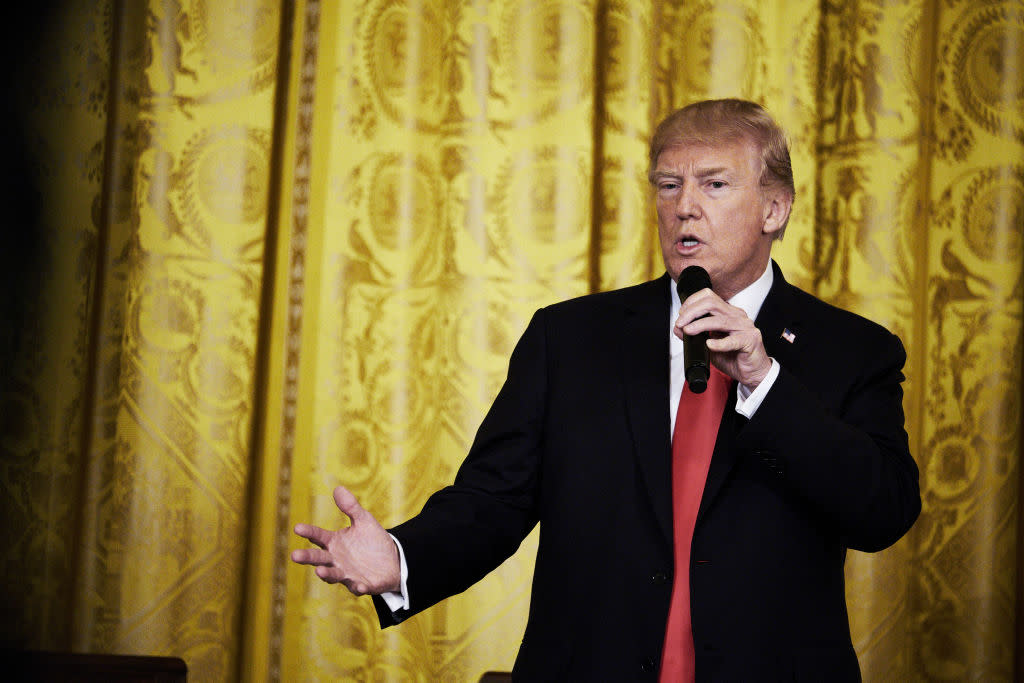Donald Trump's plan to tackle the opioid addiction crisis includes the death penalty — but will that work?

Earlier this month, Donald Trump raised eyebrows when he implied at a rally in Pennsylvania that drug dealers should be killed if they’re caught. Now, White House officials are rolling out a plan that they say is a “more nuanced” response to the opioid epidemic currently facing the U.S.
The plan, which White House officials discussed publicly on Sunday, still includes the death penalty, but only in some cases. “The Department of Justice will seek the death penalty against drug traffickers when appropriate under current law,” said Andrew Bremberg, the director of the White House’s Domestic Policy Council, according to Politico.
Current federal law allows the death penalty in drug-related crimes that involve murder, according to the Washington Post. The president wants Congress to pass a law that would more aggressively punish those who deal synthetic opioids, like fentanyl. The administration also said that it plans to reduce opioid prescriptions by one-third within three years.
The U.S. has been battling an opioid crisis for years, and the data isn’t pretty. Opioids were responsible for the majority of the 64,000 drug overdose deaths in the U.S. in 2016, according to the National Institute on Drug Abuse. The numbers also don’t seem to be slowing: Earlier this month, the Centers for Disease Control and Prevention revealed that emergency room visits for opioid overdoses increased 30 percent in all parts of the U.S. from July 2016 through September 2017.
But experts aren’t convinced that executing drug traffickers is the way to go. “The focus should be on treating addiction as a disease rather than as a capital crime,” Lindsey Vuolo, the associate director of health law and policy at the National Center on Addiction and Substance Abuse, tells Yahoo Lifestyle. Vuolo points to a recent analysis by the Pew Charitable Trusts that found that stronger punishments for drug-related crimes don’t improve public safety, deter drug use, or discourage drug dealing.
Sarah Turberville, director of the Constitution Project at the Project on Government Oversight, agrees. “The president’s proposal to seek harsher sentences, including capital punishment, is ineffective — and is a diversion from tackling what is a significant public health crisis,” she tells Yahoo Lifestyle. Threats of increased prison sentences, or even the death sentence, aren’t a solution to the problem, she says.
Federal prosecutors already have a number of tools at their disposal to pursue drug traffickers, Turberville says. “And Singapore is only a model to those unconcerned with constitutional limits on government power, like due process,” she points out. Instead, the administration should provide “meaningful policies” to help people and communities recover from opioid abuse, she says, adding that “harsher sentencing would be a dramatic step in the wrong direction.”
“Our concern with an approach that is heavily focused on enforcement is that it could exacerbate the crisis by diverting resources from effective prevention and treatment strategies,” Vuolo says. “Lack of access to effective addiction treatment is a major contributor to the current crisis.” Funding and resources are “desperately needed” to expand access to evidence-based addiction treatment and prevention across the country, Vuolo says, and that’s where the government’s focus should be.
As for the plan to reduce opioid prescriptions by a third, Vuolo says it can help keep people (especially young people) who don’t actually need prescription opioids from getting hooked on them in the first place, but it can cause unintended consequences for people who are already addicted to opioids. That’s why she says the reduction in prescriptions needs to be synced up with strategies that connect people to effective treatment. “Reducing the availability of prescription opioids without that bridge to treatment can have the unintended consequence of increasing overdose deaths as individuals turn to deadly illicit opioids such as fentanyl,” she says.
White House officials did not reveal how the proposals will be funded.
Read more from Yahoo Lifestyle:
Curvy woman opens up about having ‘Mr. Six-Pack’ as her husband, inspiring thousands
In Trump’s America, should you bring up politics on the first date?
Follow us on Instagram, Facebook, and Twitter for nonstop inspiration delivered fresh to your feed, every day.

